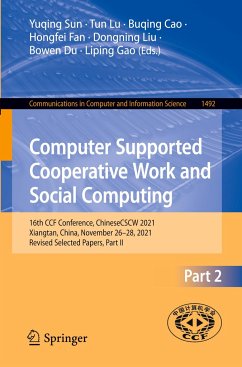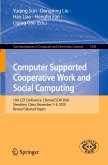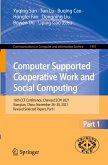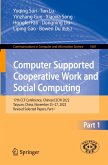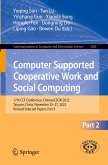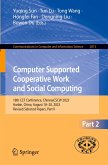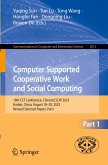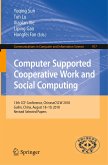Computer Supported Cooperative Work and Social Computing
16th CCF Conference, ChineseCSCW 2021, Xiangtan, China, November 26-28, 2021, Revised Selected Papers, Part II
Herausgegeben:Sun, Yuqing; Lu, Tun; Cao, Buqing; Fan, Hongfei; Liu, Dongning; Du, Bowen; Gao, Liping
Computer Supported Cooperative Work and Social Computing
16th CCF Conference, ChineseCSCW 2021, Xiangtan, China, November 26-28, 2021, Revised Selected Papers, Part II
Herausgegeben:Sun, Yuqing; Lu, Tun; Cao, Buqing; Fan, Hongfei; Liu, Dongning; Du, Bowen; Gao, Liping
- Broschiertes Buch
- Merkliste
- Auf die Merkliste
- Bewerten Bewerten
- Teilen
- Produkt teilen
- Produkterinnerung
- Produkterinnerung
The two-volume set CCIS 1491 and 1492 constitutes the refereed post-conferenceproceedings of the 16th CCF Conference on Computer Supported Cooperative Work and Social Computing, ChineseCSCW 2021, held in Xiangtan, China, November 26-28, 2021. The conference was held in a hybrid mode i.e. online and on-site in Xiangtan due to the COVID-19 crisis. The 65 revised full papers and 22 revised short papers were carefully reviewed and selected from 242 submissions. The papers are organized in the following topical sections: Volume I: Collaborative Mechanisms, Models, Approaches, Algorithms and…mehr
Andere Kunden interessierten sich auch für
![Computer Supported Cooperative Work and Social Computing Computer Supported Cooperative Work and Social Computing]() Computer Supported Cooperative Work and Social Computing106,99 €
Computer Supported Cooperative Work and Social Computing106,99 €![Computer Supported Cooperative Work and Social Computing Computer Supported Cooperative Work and Social Computing]() Computer Supported Cooperative Work and Social Computing113,99 €
Computer Supported Cooperative Work and Social Computing113,99 €![Computer Supported Cooperative Work and Social Computing Computer Supported Cooperative Work and Social Computing]() Computer Supported Cooperative Work and Social Computing76,99 €
Computer Supported Cooperative Work and Social Computing76,99 €![Computer Supported Cooperative Work and Social Computing Computer Supported Cooperative Work and Social Computing]() Computer Supported Cooperative Work and Social Computing83,99 €
Computer Supported Cooperative Work and Social Computing83,99 €![Computer Supported Cooperative Work and Social Computing Computer Supported Cooperative Work and Social Computing]() Computer Supported Cooperative Work and Social Computing76,99 €
Computer Supported Cooperative Work and Social Computing76,99 €![Computer Supported Cooperative Work and Social Computing Computer Supported Cooperative Work and Social Computing]() Computer Supported Cooperative Work and Social Computing76,99 €
Computer Supported Cooperative Work and Social Computing76,99 €![Computer Supported Cooperative Work and Social Computing Computer Supported Cooperative Work and Social Computing]() Computer Supported Cooperative Work and Social Computing38,99 €
Computer Supported Cooperative Work and Social Computing38,99 €-
-
-
The two-volume set CCIS 1491 and 1492 constitutes the refereed post-conferenceproceedings of the 16th CCF Conference on Computer Supported Cooperative Work and Social Computing, ChineseCSCW 2021, held in Xiangtan, China, November 26-28, 2021. The conference was held in a hybrid mode i.e. online and on-site in Xiangtan due to the COVID-19 crisis.
The 65 revised full papers and 22 revised short papers were carefully reviewed and selected from 242 submissions. The papers are organized in the following topical sections:
Volume I:
Collaborative Mechanisms, Models, Approaches, Algorithms and Systems; Cooperative Evolutionary Computation and Human-like Intelligent Collaboration; Domain-Specific Collaborative Applications;
Volume II:
Crowd Intelligence and Crowd Cooperative Computing; Social Media and Online Communities.
The 65 revised full papers and 22 revised short papers were carefully reviewed and selected from 242 submissions. The papers are organized in the following topical sections:
Volume I:
Collaborative Mechanisms, Models, Approaches, Algorithms and Systems; Cooperative Evolutionary Computation and Human-like Intelligent Collaboration; Domain-Specific Collaborative Applications;
Volume II:
Crowd Intelligence and Crowd Cooperative Computing; Social Media and Online Communities.
Produktdetails
- Produktdetails
- Communications in Computer and Information Science 1492
- Verlag: Springer / Springer Nature Singapore / Springer, Berlin
- Artikelnr. des Verlages: 978-981-19-4548-9
- 1st ed. 2022
- Seitenzahl: 552
- Erscheinungstermin: 23. Juli 2022
- Englisch
- Abmessung: 235mm x 155mm x 30mm
- Gewicht: 826g
- ISBN-13: 9789811945489
- ISBN-10: 9811945489
- Artikelnr.: 64122806
- Herstellerkennzeichnung
- Springer-Verlag GmbH
- Tiergartenstr. 17
- 69121 Heidelberg
- ProductSafety@springernature.com
- Communications in Computer and Information Science 1492
- Verlag: Springer / Springer Nature Singapore / Springer, Berlin
- Artikelnr. des Verlages: 978-981-19-4548-9
- 1st ed. 2022
- Seitenzahl: 552
- Erscheinungstermin: 23. Juli 2022
- Englisch
- Abmessung: 235mm x 155mm x 30mm
- Gewicht: 826g
- ISBN-13: 9789811945489
- ISBN-10: 9811945489
- Artikelnr.: 64122806
- Herstellerkennzeichnung
- Springer-Verlag GmbH
- Tiergartenstr. 17
- 69121 Heidelberg
- ProductSafety@springernature.com
Crowd Intelligence and Crowd Cooperative Computing.- Locally Linear Embedding Discriminant Feature Learning Model.- Cache Optimization based on Linear Regression and DAG Task Graph.- A University Portrait System Incorporating Academic Social Network.- Multi-objective Optimization Of Ticket Assignment Problem In Large Data Centers.- Joint Embedding Multiple Feature and Rule for Paper Recommendation.- Predicting Drug-Target Interactions Binding Affinity by Using Dual Updating Multi-Task Learning.- GRE: A GAT-based Relation Embedding Model of Knowledge Graph for Recommendation.- Locating Hidden Sources in Evolutionary Games Based on Fuzzy Cognitive Map.- Deep bug triage model based on multi-head self-attention mechanism.- Taxi Pick-up Area Recommendation via Integrating Spatio-temporal Contexts into XDeepFM.- Learning When to Communicate among Actors with Centralized Critic for Multi-agent System.- Social Media and Online Communities.- Academic text classification algorithm based on pre-trained model and keyword extraction.- ResConvE: Deeper Convolution-based Knowledge Graph Embeddings.- Extractive-Abstractive: A Two-Stage Model for Long Text Summarization.- A Random-walk-based Heterogeneous Attention Network for Community Detection.- Attributed Network Embedding based on Attributed-subgraph-based Random Walk for Community Detection.- Adaptive Seed Expansion Based on Composite Similarity for Community Detection in Attributed Networks.- MDN: Meta-transfer Learning Method for Fake News Detection.- Local Community Detection Algorithm Based on Core Area Expansion.- Federated Clique Percolation for Overlapping Community Detection on Attributed Networks.- A new academic conference information management system based on social network.- A Full Information Enhanced Question Answering System Based on Hierarchical Heterogeneous Crowd Intelligence Knowledge Graph.- Exploring the Content Sharing Practice across Social Network Sites.- An Improved Label Propagation Algorithm for Community Detection Fusing Temporal Attributes.- Understanding Scholar Social Networks: Taking SCHOLAT as An Example.- SCHOLAT Link Prediction: A Link Prediction Dataset Fusing Topology and Attribute Information.- A Graph Neural Network-based Approach for Predicting Second Rise of Information Diffusion on Social Networks.- HPEMed: Heterogeneous Network Pair Embedding for Medical Diagnosis.- MR-LGC: A Mobile Application Recommendation Based on Light Graph Convolution Networks.- Neural Matrix Decomposition Model Based on Scholars' Influence.- DOCEM: A Domain-embedding-based Open-source Community Event Monitoring Model.- Diversified Concept Attention Method for Knowledge Tracing.- Self-auxiliary Hashing for Unsupervised Cross Modality Retrieval.- RCBERT An Approach with transfer learning for App reviews classification.- The Impact of COVID-19 on Online Games: Machine Learning and Difference-In-Difference.- Uncertain Graph Publishing of Social Networks for Objective Weighting of Nodes.- Federated Multi-label Propagation Based on Neighbor Node Influence for Community Detection on Attributed Networks.- AcaVis: A Visual Analytics Framework for Exploring Evolution of Dynamic Academic Networks.- Dynamic Information Diffiusion Model Based on Weighted Information Entropy.
Crowd Intelligence and Crowd Cooperative Computing.- Locally Linear Embedding Discriminant Feature Learning Model.- Cache Optimization based on Linear Regression and DAG Task Graph.- A University Portrait System Incorporating Academic Social Network.- Multi-objective Optimization Of Ticket Assignment Problem In Large Data Centers.- Joint Embedding Multiple Feature and Rule for Paper Recommendation.- Predicting Drug-Target Interactions Binding Affinity by Using Dual Updating Multi-Task Learning.- GRE: A GAT-based Relation Embedding Model of Knowledge Graph for Recommendation.- Locating Hidden Sources in Evolutionary Games Based on Fuzzy Cognitive Map.- Deep bug triage model based on multi-head self-attention mechanism.- Taxi Pick-up Area Recommendation via Integrating Spatio-temporal Contexts into XDeepFM.- Learning When to Communicate among Actors with Centralized Critic for Multi-agent System.- Social Media and Online Communities.- Academic text classification algorithm based on pre-trained model and keyword extraction.- ResConvE: Deeper Convolution-based Knowledge Graph Embeddings.- Extractive-Abstractive: A Two-Stage Model for Long Text Summarization.- A Random-walk-based Heterogeneous Attention Network for Community Detection.- Attributed Network Embedding based on Attributed-subgraph-based Random Walk for Community Detection.- Adaptive Seed Expansion Based on Composite Similarity for Community Detection in Attributed Networks.- MDN: Meta-transfer Learning Method for Fake News Detection.- Local Community Detection Algorithm Based on Core Area Expansion.- Federated Clique Percolation for Overlapping Community Detection on Attributed Networks.- A new academic conference information management system based on social network.- A Full Information Enhanced Question Answering System Based on Hierarchical Heterogeneous Crowd Intelligence Knowledge Graph.- Exploring the Content Sharing Practice across Social Network Sites.- An Improved Label Propagation Algorithm for Community Detection Fusing Temporal Attributes.- Understanding Scholar Social Networks: Taking SCHOLAT as An Example.- SCHOLAT Link Prediction: A Link Prediction Dataset Fusing Topology and Attribute Information.- A Graph Neural Network-based Approach for Predicting Second Rise of Information Diffusion on Social Networks.- HPEMed: Heterogeneous Network Pair Embedding for Medical Diagnosis.- MR-LGC: A Mobile Application Recommendation Based on Light Graph Convolution Networks.- Neural Matrix Decomposition Model Based on Scholars' Influence.- DOCEM: A Domain-embedding-based Open-source Community Event Monitoring Model.- Diversified Concept Attention Method for Knowledge Tracing.- Self-auxiliary Hashing for Unsupervised Cross Modality Retrieval.- RCBERT An Approach with transfer learning for App reviews classification.- The Impact of COVID-19 on Online Games: Machine Learning and Difference-In-Difference.- Uncertain Graph Publishing of Social Networks for Objective Weighting of Nodes.- Federated Multi-label Propagation Based on Neighbor Node Influence for Community Detection on Attributed Networks.- AcaVis: A Visual Analytics Framework for Exploring Evolution of Dynamic Academic Networks.- Dynamic Information Diffiusion Model Based on Weighted Information Entropy.

